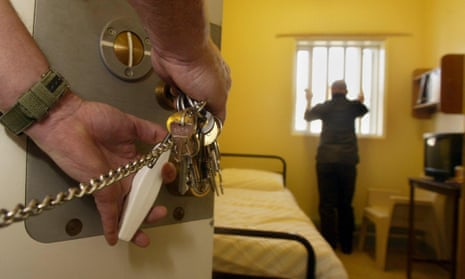Jails-within-jails designed to prevent extremists from radicalising vulnerable prisoners are undersubscribed, staff at the specialist units have told officials.
The separation centres were launched in 2017 to keep the most influential extremist prisoners from radicalising the broader prison population but critics have accused them of making ideologies more entrenched and discriminating against Muslims.
The Ministry of Justice estimates that about 700 to 1,000 prisoners are considered a risk owing to their extremist views and as of 31 March 2019 there were 223 people in custody in Britain for terrorism-related offences.
But staff at two of the three separation centres told MoJ researchers that referral rates to the units were too low. Frankland prison and Full Sutton prison each have the capacity to hold eight prisoners, but between June 2017 and December 2018 were holding only three to six prisoners on average, the study showed. A third facility at Woodhill prison is reportedly empty.
One of the reasons given for the low number of referrals was poor recording of extremism behaviours across the prison estate.
“It was also thought that selection for the separation centres was quite rigid, with few prisoners meeting the criteria, especially where all alternative management strategies had been exhausted,” the paper added.
Prisoners were refusing to engage or cooperate with staff, the paper said, with some being actively encouraged by their lawyers to do so and a number challenging their detention in the centre through the courts.
Some prisoners refused to take part in a care plan process because they had been advised against engaging by their solicitors, while others wanted to undermine the success of the centres. Some were happy and did not want to be returned to mainstream prisons, the paper said.
Staff at both Frankland and Full Sutton reported that the prisoners felt they were being discriminated against by being placed in a separation centre, particularly as all those separated were Muslim. There were some reports of the men referring to the centres as “concentration camps”, “Guantánamo Bay” and “Muslim centres”.
All of the prisoners during the study period were considered to be Islamist extremists. The Islamist preacher Anjem Choudary was reportedly detained in one of the centres. At the time of the study, there had been no referrals made for extreme rightwing offenders.
Prisoners in both centres all used the same legal team and were using their solicitors to compare conditions between the two centres, as well as mainstream prisons, and lodging multiple complaints over any differences established, the paper said.
There were 56 complaints made at Frankland over an 18-month period and 210 at Full Sutton over nine months. More than half of the complaints at Full Sutton were made by one individual.
“Complaints tended to centre around the regime being offered and were often duplicate complaints,” the paper said.
“When staff provided requested activities (where appropriate), the men did not always engage, suggesting to staff this was an attempt to challenge rather than for a genuine desire to take part. As a number of the men were legally challenging their separation on to the centres, some of the resistance to engaging was perceived to stem from this.”
The first centre was opened in June 2017 at Frankland and the second in March 2018 at Full Sutton. Fieldwork for the study was carried out between July 2017 and December 2018.
Interviews with officers and managers were conducted, as well as interviews with staff involved in the delivery of psychology, chaplaincy, education, counter-terrorism (CT) and healthcare services. The prisoners refused to take part.
This footnote was added on 2 August 2019. Following publication the solicitors referred to in the report have asked us to make clear they do not advise their clients not to engage with staff at the separation centres and as such no such advice was given.
